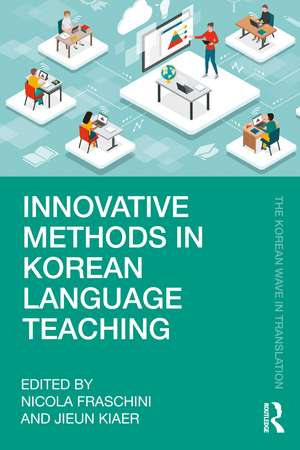Innovative Methods in Korean Language Teaching: The Korean Wave in Translation
Editat de Nicola Fraschini, Jieun Kiaeren Limba Engleză Paperback – 30 dec 2024
The chapters included in this book consider a wide range of innovative technologies and approaches, such as Large Language Models, Virtual Reality solutions, metaverse platforms, multimodal teaching, and critical pedagogy, and represent a variety of geographical learning contexts from North America to Europe, from Korea to the broader Asia-Pacific region. Overall, these contributions make the case for embracing new technologies instead of banning them and for accepting pedagogical shifts that take into consideration contemporary understandings of the communication, teaching, and learning processes.
This book will be of interest to graduate students, researchers and practitioners of Korean language education, and to those working on language teaching and learning in general, to inform future teaching practices through careful consideration of contemporary technologies and teaching approaches.
| Toate formatele și edițiile | Preț | Express |
|---|---|---|
| Paperback (1) | 257.09 lei 3-5 săpt. | +16.94 lei 5-11 zile |
| Taylor & Francis – 30 dec 2024 | 257.09 lei 3-5 săpt. | +16.94 lei 5-11 zile |
| Hardback (1) | 935.98 lei 6-8 săpt. | |
| Taylor & Francis – 30 dec 2024 | 935.98 lei 6-8 săpt. |
Preț: 257.09 lei
Nou
Puncte Express: 386
Preț estimativ în valută:
49.20€ • 51.18$ • 40.62£
49.20€ • 51.18$ • 40.62£
Carte disponibilă
Livrare economică 24 martie-07 aprilie
Livrare express 08-14 martie pentru 26.93 lei
Preluare comenzi: 021 569.72.76
Specificații
ISBN-13: 9781032725260
ISBN-10: 1032725265
Pagini: 226
Ilustrații: 76
Dimensiuni: 156 x 234 x 14 mm
Greutate: 0.3 kg
Ediția:1
Editura: Taylor & Francis
Colecția Routledge
Seria The Korean Wave in Translation
Locul publicării:Oxford, United Kingdom
ISBN-10: 1032725265
Pagini: 226
Ilustrații: 76
Dimensiuni: 156 x 234 x 14 mm
Greutate: 0.3 kg
Ediția:1
Editura: Taylor & Francis
Colecția Routledge
Seria The Korean Wave in Translation
Locul publicării:Oxford, United Kingdom
Public țintă
Postgraduate and Professional ReferenceNotă biografică
Nicola Fraschini is a Senior Lecturer at the University of Melbourne Asia Institute, where he is convener of the Korean Studies program and director of the Global Korea Research Hub. His research interests are the psychology of language learners and teachers, and Q methodology.
Jieun Kiaer is the YBMK KF Professor of Korean Linguistics in the University of Oxford’s Asian and Middle Eastern Studies Faculty. She publishes widely on linguistics, Asian studies, and translation. Her recent research covers the future of human language, social media behaviours, big data, and AI linguistics. Wearing the hats of linguist, pragmatist, and Asian specialist, she is uniquely positioned to respond to the recent developments in AI.
Jieun Kiaer is the YBMK KF Professor of Korean Linguistics in the University of Oxford’s Asian and Middle Eastern Studies Faculty. She publishes widely on linguistics, Asian studies, and translation. Her recent research covers the future of human language, social media behaviours, big data, and AI linguistics. Wearing the hats of linguist, pragmatist, and Asian specialist, she is uniquely positioned to respond to the recent developments in AI.
Cuprins
Acknowledgement
List of Contributors
AI Declaration
Introduction. Innovative methods for global Korean language teaching.
Part I. Large language models and Korean language education
Chapter 1. AI-powered writing assistance: Korean Language students’ and teachers’ views and experiences.
Chapter 2. Students’ perceptions of utilizing AI chatbots as conversation partners for Korean speaking practice: acceptance, benefits, and challenges.
Chapter 3. Large Language Models for Korean grammar and spelling corrections: A comparative evaluation of Bard, Bing, ChatGPT, Clova X, and Perplexity AI.
Chapter 4. The potential of generative AI in writing feedback for L2 learners: An analysis on grammar error correction by ChatGPT-3.5 for TOPIK II writing tasks.
Part II. VR, metaverse and other technology-based approaches to Korean language teaching
Chapter 5. Virtual interactions in Seoul: Implementation of high-immersion Virtual Reality (HiVR) technology in a Korean language class
Chapter 6. Exploring the possibilities and limits of metaverse as a Korean teaching resource: The case of Sejong Institute’s metaverse proposal.
Chapter 7. Using a YouTube channel as a supplementary language teaching and learning platform.
Part III. Moving beyond technology for innovation in Korean language teaching
Chapter 8. Excitement and confusion: An emotion-based approach to Korean language teaching.
Chapter 9. Multimodal approaches to Korean language teaching.
Chapter 10. Transformative learning through Critical Pedagogy in Korean language education.
Additional resources
Index
List of Contributors
AI Declaration
Introduction. Innovative methods for global Korean language teaching.
Part I. Large language models and Korean language education
Chapter 1. AI-powered writing assistance: Korean Language students’ and teachers’ views and experiences.
Chapter 2. Students’ perceptions of utilizing AI chatbots as conversation partners for Korean speaking practice: acceptance, benefits, and challenges.
Chapter 3. Large Language Models for Korean grammar and spelling corrections: A comparative evaluation of Bard, Bing, ChatGPT, Clova X, and Perplexity AI.
Chapter 4. The potential of generative AI in writing feedback for L2 learners: An analysis on grammar error correction by ChatGPT-3.5 for TOPIK II writing tasks.
Part II. VR, metaverse and other technology-based approaches to Korean language teaching
Chapter 5. Virtual interactions in Seoul: Implementation of high-immersion Virtual Reality (HiVR) technology in a Korean language class
Chapter 6. Exploring the possibilities and limits of metaverse as a Korean teaching resource: The case of Sejong Institute’s metaverse proposal.
Chapter 7. Using a YouTube channel as a supplementary language teaching and learning platform.
Part III. Moving beyond technology for innovation in Korean language teaching
Chapter 8. Excitement and confusion: An emotion-based approach to Korean language teaching.
Chapter 9. Multimodal approaches to Korean language teaching.
Chapter 10. Transformative learning through Critical Pedagogy in Korean language education.
Additional resources
Index
Descriere
Innovative Methods in Korean Language Teaching showcases research-based and experience-based contributions and reflections on the potential of adopting technological and non-technological innovations to promote Korean language students’ learning.

